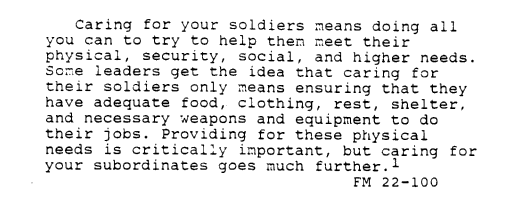"Look upon your soldiers like beloved children, and they willingly die with you." Sun Tzu's Art of War
Liu Ji, a military strategist and top adviser to the Emperor Zhu Yuanzhang who founded the Ming Dynasty, used the the same Sun Tzu quote above to tell of a story of Wu Qi. Wu Qi was a Wei general during the Warring States period. He was widely feared by his enemies because of his fearless army.
Wu Qi wore the same clothes and ate the same food as his lowest-ranked soldier. He did not use a mat when sitting and did not ride in a carriage when traveling. Like his soldiers, he walked when traveling, carrying his own supplies and belongings. Essentially, he experienced the same toil and hardships as his army.
Once, when Wu Qi noticed a festering wound on one of his soldiers, he sucked the pus out of it. When the soldier's mother heard this, she mourned. Wu Qi personally cared for her husband in a similar manner, and as a result, he died in battle advancing without taking a single step backwards. She now wonders where her son will perish as well.
Liu Ji noted, "It was because Wu Qi was strict with himself while impartial toward others, and had won the hearts of his soldiers that a Lord of Wei had made him military governor of West River."
There is no such thing as good leadership, sound leadership, or effective leadership. There is only leadership. It's either you have it or you don't. And so leadership demands taking care of those who take care of you.
Alexander the Great not only cavorted with his soldiers, he also fought and led them from the front in battle. Creating one of the largest empires of the ancient world, Alexander did not lose one single battle in his lifetime.
Sometimes military leaders can treat their soldiers well even when they aren't human. During an intense build up to an important battle during the US Civil War, General Ulysses Grant spotted a teamster beating a horse in the face with the butt-end of a whip, trying to free up a wagon stuck in mud. The usual calm Grant was so outraged that he ordered the teamster be tied to a tree for hours, presumably to allow him to think about his cruel actions.
In an activity such as warfare, where the outcome is so critical, it would seem inevitable that humanity takes a backseat to success. Sun Tzu disagrees. He believes that treating people on all sides with humaneness and victory in conflict are one and the same. Ensuring the success of a strategy means ensuring the success of others. Thinking about strategy means thinking about everyone. Taking care of strategy means taking care of even the lowest among us.
Wu Qi wore the same clothes and ate the same food as his lowest-ranked soldier. He did not use a mat when sitting and did not ride in a carriage when traveling. Like his soldiers, he walked when traveling, carrying his own supplies and belongings. Essentially, he experienced the same toil and hardships as his army.
Once, when Wu Qi noticed a festering wound on one of his soldiers, he sucked the pus out of it. When the soldier's mother heard this, she mourned. Wu Qi personally cared for her husband in a similar manner, and as a result, he died in battle advancing without taking a single step backwards. She now wonders where her son will perish as well.
Liu Ji noted, "It was because Wu Qi was strict with himself while impartial toward others, and had won the hearts of his soldiers that a Lord of Wei had made him military governor of West River."
There is no such thing as good leadership, sound leadership, or effective leadership. There is only leadership. It's either you have it or you don't. And so leadership demands taking care of those who take care of you.
Alexander the Great not only cavorted with his soldiers, he also fought and led them from the front in battle. Creating one of the largest empires of the ancient world, Alexander did not lose one single battle in his lifetime.
Sometimes military leaders can treat their soldiers well even when they aren't human. During an intense build up to an important battle during the US Civil War, General Ulysses Grant spotted a teamster beating a horse in the face with the butt-end of a whip, trying to free up a wagon stuck in mud. The usual calm Grant was so outraged that he ordered the teamster be tied to a tree for hours, presumably to allow him to think about his cruel actions.
In an activity such as warfare, where the outcome is so critical, it would seem inevitable that humanity takes a backseat to success. Sun Tzu disagrees. He believes that treating people on all sides with humaneness and victory in conflict are one and the same. Ensuring the success of a strategy means ensuring the success of others. Thinking about strategy means thinking about everyone. Taking care of strategy means taking care of even the lowest among us.


 RSS Feed
RSS Feed